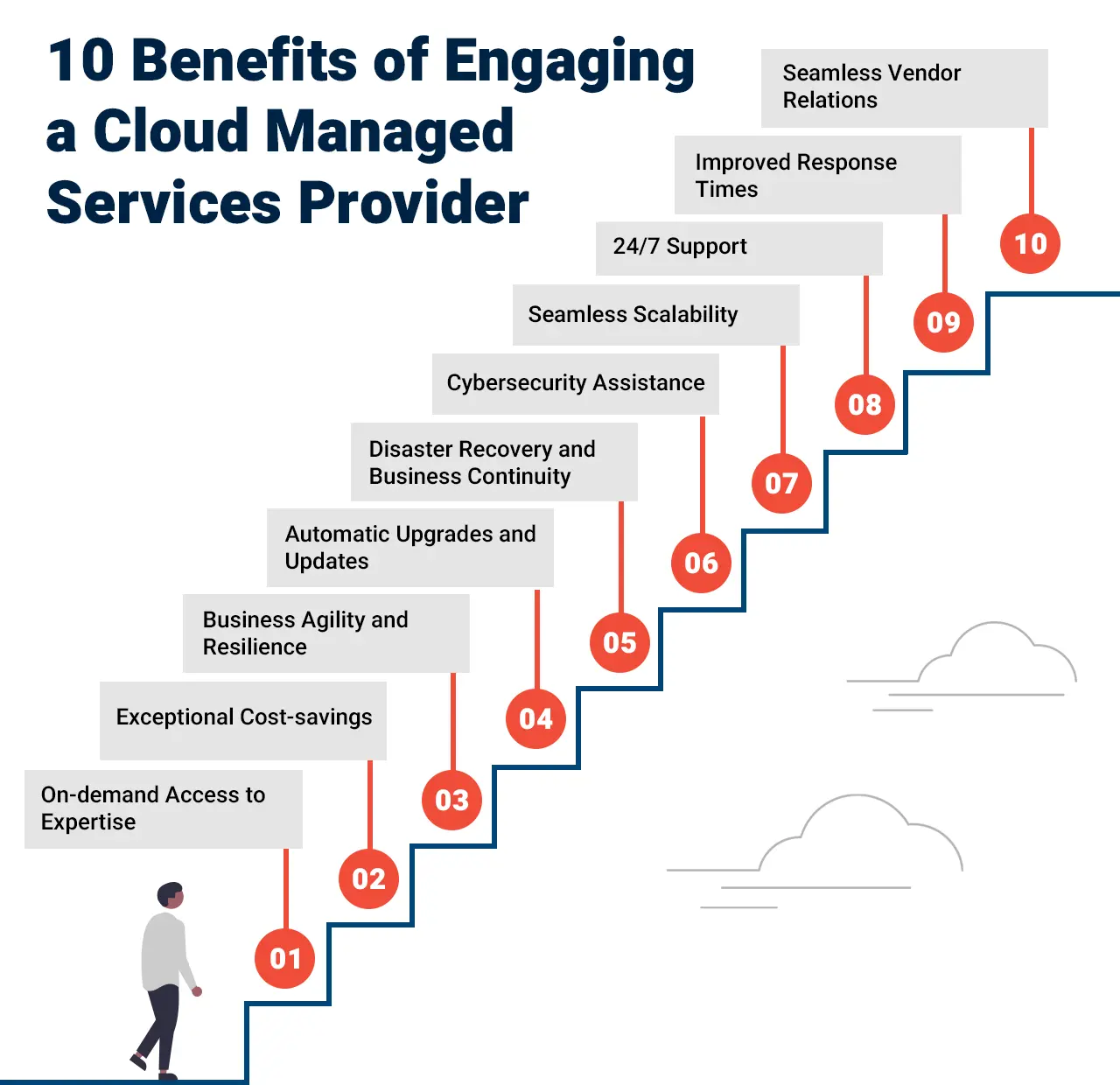May 9, 2025 - by Synoptek
Digital transformation is no longer optional—it’s a business imperative, and the cloud plays a huge role. According to Gartner, 90% of organizations will adopt a hybrid cloud by 2027, and worldwide public cloud end-user spending will reach $723 billion in 2025. This is where cloud managed services come in.

These services help businesses navigate challenges such as rising security concerns, a shortage of skilled talent, and growing infrastructure costs. IT departments are under more pressure than ever to do more with less while maintaining agility and resilience. According to Gartner, enterprises are accelerating their shift to cloud-based and managed service models to drive scalability and efficiency in today’s complex digital environments.
Companies must rely on expert support to stay competitive and thrive in a fast-evolving digital landscape. In this blog, we’ll explore Cloud Managed Services and unveil the top 10 benefits of partnering with a cloud managed service provider so that you can focus on innovation. At the same time, your IT infrastructure runs like a well-oiled machine.
What are Managed Cloud Services?
Cloud managed services are comprehensive outsourced services offered by Managed Cloud Service Providers (MSPs), designed to support, optimize, and manage a company’s cloud infrastructure, applications, and operations. These services help organizations streamline IT management by ensuring continuous performance monitoring, security, compliance, data backups, and proactive support across public, private, and hybrid cloud environments.
In short, cloud managed services allow businesses to offload the complexities of cloud management to expert providers. This will enable them to focus on innovation, core operations, and strategic growth while ensuring their cloud infrastructure runs efficiently, securely, and cost-effectively.
What is a Cloud Managed Service provider?
A Managed Cloud Service Provider (MSP) is a trusted third-party company that remotely manages a client’s IT infrastructure and systems. A cloud provider thoroughly evaluates your current IT landscape, implements the required solutions, and manages them consistently so you can efficiently meet your business goals.
Why opt for Cloud Managed Services?
If your company has shifted into the cloud, you will need the support to maintain, protect, and analyze your infrastructure at a high standard. A competent Cloud MSP (Managed Service Provider) takes care of various tasks, including operations management, hosting and implementation, on-demand engineering, and the speedy evaluation of data. By offering help with a 24/7 full-service IT department, a reputable Cloud MSP will help you ensure your cloud-enabled business is running smoothly.
See the section below if you are wondering why you need to engage with a Managed Cloud Service Provider and not just any Cloud Service Provider or CSP.
How do MSPs differ from CSPs?
While both Cloud Service Providers (CSPs) and Managed Service Providers (MSPs) play essential roles in the cloud ecosystem, they serve distinct functions:
- CSPs provide essential services to organizations to help them with their cloud computing needs. These services are all accessed via the Internet and provide a highly customizable software platform for the customer’s needs.
- Managed Cloud Computing Services deliver ongoing support via active administration, including infrastructure management and security. Often, these service providers manage services 24/7 for specific IT-related functions such as data storage, financial services, management services, and more.
The main difference between MSPs and CSPs is that an MSP manages the technology and infrastructure that you own. At the same time, a CSP offers access to its technology and infrastructure.
Top 10 Benefits of a Cloud Managed Services Provider
Let’s uncover the benefits you will have access to once you engage with a Cloud Managed Services provider:
1. On-demand Access to Expertise
With a Cloud Managed Services provider, you get on-demand access to experienced and qualified resources with deep knowledge in your area of expertise. These resources not only help develop a tailored blueprint to help you meet larger business goals, but they also provide timely strategic guidance and implement a proven set of processes so you can harness the full power of your IT ecosystem.
2. Exceptional Cost-savings
Access to the resources and tools you need, when you need them, is a great way to enable cost savings. With cloud managed IT services, you no longer need to spend the time, effort, or money finding expert IT talent, hiring them, and upskilling them to reduce churn. By leveraging the pay-per-use model, you can minimize upfront capital investments while streamlining your monthly operational bill.
3. Business Agility and Resilience
You can drive high business agility and resilience with a Cloud Managed Services provider. Since a partner usually would have a robust network infrastructure with 24/7 management, you can have them monitor and scan the underlying technology and ensure you comply with the necessary industry and regulatory standards. A partner can also ensure your IT systems are reliable, sturdy, and functioning at par with current trends.
4. Automatic Upgrades and Updates
A Cloud Managed Services provider also ensures your IT infrastructure is up to date. By investing in your company, a partner will try to implement the latest security patches and updates and suggest system upgrades, as and when they’re available. Such automatic upgrades and updates make sure you never fall behind; they also help prevent costly downtime while enhancing the security of your servers and networks.
5. Disaster Recovery and Business Continuity
The pandemic has made it clear that any unexpected event can bring all types of businesses to a screeching halt. A Managed Cloud Computing Services provider can help your business stay operational despite an outage, a hacking attempt, or a crashed server. Regular data backup onto the cloud can help protect precious data while ensuring employees and customers enjoy uninterrupted service.
6. Cloud Security
Cloud Managed IT Services providers also provide cutting-edge cybersecurity support that can safeguard you from the growing number of attacks while strengthening the security foundation of your business. Since a provider has a thorough knowledge of your IT infrastructure and updated information on present-day threats, you can minimize the risk of losing sensitive and valuable data to hackers and other cybercriminals.
By implementing adequate security controls such as antivirus software, encryption, and multi-factor authentication, a provider can protect your business and proactively spot signs of an attack.
7. Seamless Scalability
Cloud computing managed services also make it easy for businesses to meet the increased demand for products and services. The ability to scale storage and compute resources means you can quickly meet your needs, irrespective of what time of day or what season of the year. With a provider in tow, you no longer have to worry about limited space, costly infrastructure, or slow rollouts. You can be sure of having the right systems and products to keep up with your business’ growing (or shrinking) requirements.
8. 24/7 Support
Another critical benefit of partnering with a Cloud Managed Services provider is 24/7 support. Most cloud computing managed services need continuous technical support, which means that if significant problems arise during or after business hours, you can have them rectified in time. A provider will find a workaround as an immediate solution and make necessary changes so you don’t re-encounter the problem.
9. Improved Response Times
Your business can expect quick response times with a Cloud Managed Services provider. Enterprise-wide monitoring via remote cloud-managed IT services means IT experts constantly monitor your IT ecosystem and repair issues, as and when they occur.
Also, since most cloud providers use automation, you do not have to worry about breaching SLAs or disgruntled employees and customers. Your provider will offer exceptional control over service levels, performance, and maintenance while ensuring the IT foundation of your business is always robust.
10. Seamless Vendor Relations
Today’s Managed Cloud Service Providers maintain good relations with IT vendors. So, if you face vendor-specific service issues, your provider will take care of them quickly and seamlessly. Your provider will contact third-party vendors, ask the right technical questions, and work with them to resolve issues quickly. At the same time, your provider can help implement changes so you can focus on growing your business.
Moving Forward with Cloud Managed Services
The pressure to undergo digital transformation is widespread. Although most organizations have realized the importance of transforming themselves, not everyone has the time, money, or capabilities needed for successful transformation.
Partnering with a qualified Cloud Managed Services provider is a great way to achieve the right results for such organizations. A partner can recommend tried-and-tested plans and industry best practices to protect your enterprise, optimize resources, and grow your business by maturing processes and capabilities. A partner can also help redefine operational processes, integrate systems, and evolve technology in a high-service-level, high-quality manner.



